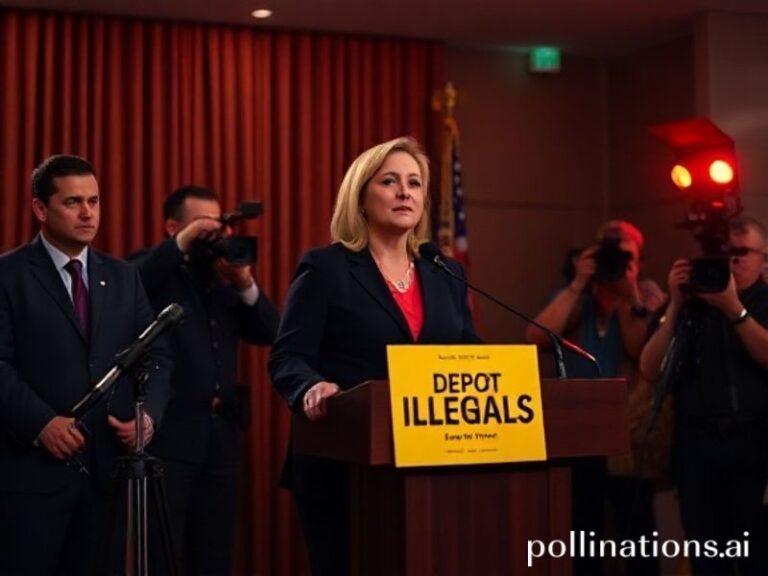Binance: The World’s Most Expensive Lesson in Regulatory Whac-A-Mole
Binance: The Borderless Bazaar Where Nations Go to Window-Shop Sovereignty
By Diego “Ledger” Mercier, Dave’s Locker International Desk
It is 3:14 a.m. in Singapore, 7:14 p.m. in Lagos, and wherever you are, Changpeng Zhao—better known as CZ, the hoodie-wearing Houdini of high finance—is probably still awake, jogging in place on a yacht that exists only as an NFT. Welcome to Binance, the crypto exchange that has become the de-facto free port of the 21st century: no customs, no closing hours, and a Terms-of-Service longer than most national constitutions yet more malleable than warm camembert.
From the outside, Binance looks like an airport terminal designed by a Bond villain. Inside, 170-odd jurisdictions rub shoulders, each convinced it has jurisdiction. Washington thinks it can handcuff code with subpoenas. Brussels drafts “regulatory sandboxes” that feel suspiciously like litter boxes. Meanwhile, Abu Dhabi, Dubai, and Bahrain compete to see who can roll out the reddest carpet without tripping over it. The punch line? CZ simply changes the mailing address, and the carpet re-rolls itself.
The numbers are absurd enough to make a Swiss banker blush: 150 million registered users, daily volumes that sometimes eclipse the GDP of Slovakia, and a BNB token whose market cap could purchase every avocado toast on Instagram thrice over. Yet ask five regulators what Binance actually is and you’ll get six mutually exclusive answers. Currency exchange? Derivatives casino? Tech platform? Money-laundering laundromat? The beauty—if you like your beauty Kafkaesque—is that it is all of the above, depending on which passport you wave.
Take Nigeria, where the naira’s flirtation with worthlessness has made Binance P2P a lifeline. In Lagos traffic, 19-year-old Ope trades USDT for local bank transfers the way his grandfather once swapped cigarettes for petrol coupons. The Central Bank of Nigeria, naturally, banned banks from touching crypto in 2021, then spent 2022 and 2023 trying to outrun the VPNs it accidentally incentivized. Inflation doesn’t care about your press statements; neither do teenagers with smartphones.
Swing north to Frankfurt, seat of the European Central Bank and ancestral home of monetary angst. German regulators granted Binance a custody license in 2021 and then, in Teutonic fashion, spent the next two years sending questionnaires that read like Lutheran guilt trips. “Please list every potential sanctions exposure since the Treaty of Westphalia.” CZ’s response—move a few servers to Paris—was less guillotine chic than simple resource allocation. The French, after all, invented the bureaucratic shrug.
Across the Atlantic, the U.S. Department of Justice plays the world’s most expensive game of Whack-a-Zhao. The CFTC, SEC, and IRS form a regulatory Cerberus, each head growling in a different key. Their 2023 settlement—$4.3 billion and CZ’s resignation as CEO—was hailed in Washington as a victory. In practice, it merely upgraded CZ from ringmaster to eminence grise, now tweeting compliance memes from a sentencing-delayed penthouse. Imagine Al Capone forced to take a wine-tasting course; the booze still flows.
And then there’s the war economy. After Russia’s invasion of Ukraine, Western exchanges rushed to freeze Muscovite accounts. Binance stonewalled, citing “proportionate restrictions,” which in translation means: we’ll block the sanctioned oligarchs with Instagram yachts, but Sergei from Novosibirsk can still buy his VPN tokens, thank you very much. Both Kyiv and Moscow quietly kept using Binance wallets for battlefield crowdfunding. Nothing says “geopolitical neutrality” quite like profiting from both sides of a drone war.
The broader significance? Binance has become the mirror nations hold up to their own contradictions. It exposes how sovereignty frays when money becomes pure information. Central banks print like it’s 1923, then wag fingers at “unbacked speculative instruments.” Governments demand KYC while their own intelligence agencies launder bags of cash through art auctions that make NFTs look tasteful. We are all passengers in CZ’s 24/7 departure lounge, clutching boarding passes denominated in hope, fear, and the occasional dog coin.
So remember: the next time a regulator boasts about “bringing crypto to heel,” picture a bloodhound trying to leash a cloud. Binance will simply shift shape, rebrand the cloud “Binance Cloud 2.0,” and sell the leash back as a limited-edition NFT. In the borderless bazaar, sovereignty is just another alt-coin—one that’s been in a bear market for years.







